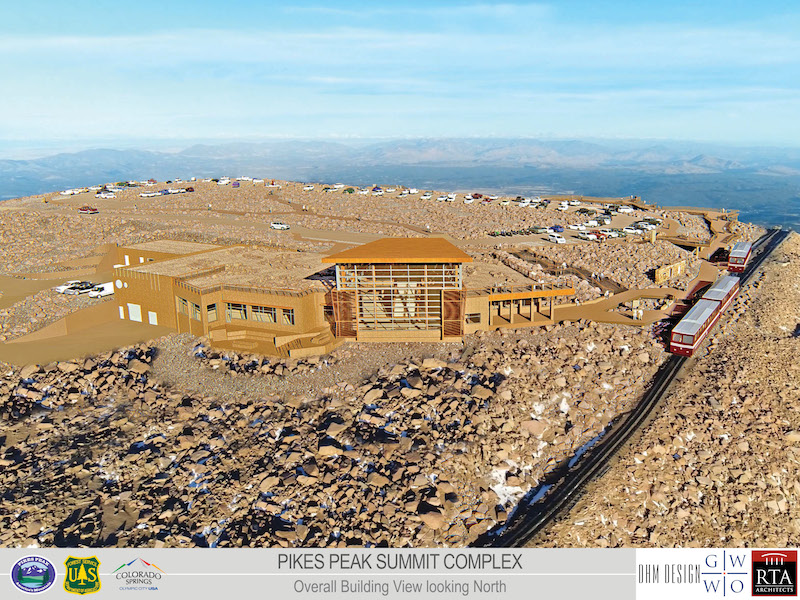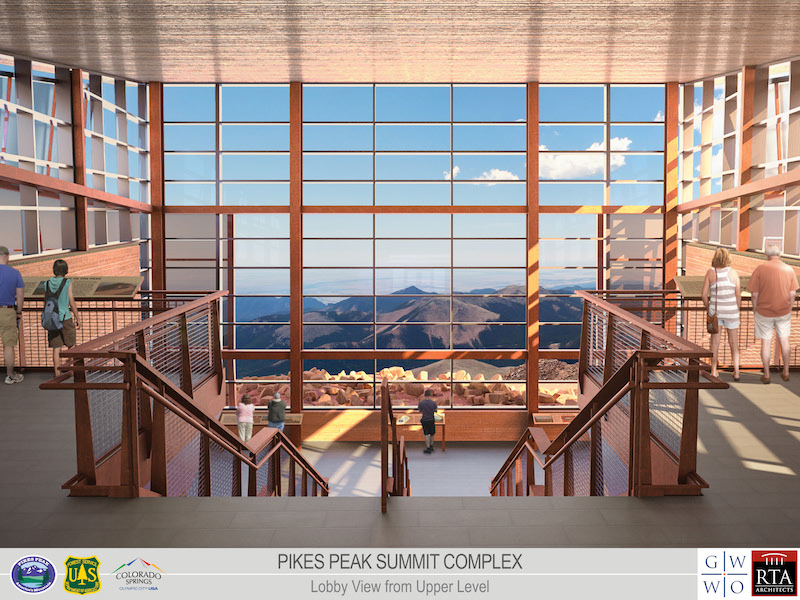More than 600,000 people annually scale the 14,115 feet to reach the summit of Pikes Peak in Colorado Springs, Colo. Until recently, they were greeted by a Summit Complex that had fallen into disrepair. But that’s about to change, as the city of Colorado Springs, in partnership with the U.S. Forest Service, U.S. Army Research Institute of Environmental Medicine, and Colorado Springs Utilities, is building a new Summit Complex and Visitors Center, which breaks ground on June 4.
A second site will consolidate a Plant Building, CSU Communications Facility, and High-Altitude Research Laboratory. The existing Summit House will remain open through the end of construction in the fall of 2020.
The project’s budget is $50 million. The building will be 26,000 sf (compared to the existing center’s 12,000 sf), and include a 200-seat dining area, gift shop, and parking for up to 200 cars.
Pikes Peak, which brigadier general and explorer Zebulon Pike discovered in 1806, is often called America’s Mountain, and its summit is a National Historic Landmark. Its scenic highway let’s anyone, regardless of age or physical condition, reach its apex, with recreation areas and trails along the way.
The intent of this project’s Building Team is to give a seamless, immersive, fully accessible experience with facilities specifically designed for the summit’s harsh environment. “Our goal was to put the experience of Pikes Peak first—the breathtaking views and spectacular beauty—while minimizing the visual impact of architecture on the mountain,” says Alan Reed, FAIA, Design Principal for GWWO Inc./Architects, the Baltimore-based firm that’s the project’s design architect.
RTA Architects is the architect of record. The rest of the Building Team includes HCDA Engineering (SE), Kiowa Engineering (CE) ME Group (MEP), GE Johnson Construction (GC), DHM Design (landscape architect), AECOM (extreme climate consultant), Gallagher & Associates (exhibit design), Jensen Hughes (code and accessibility consultant), The Preservation Studio (historic preservation), NASH Architectural Solutions (specifications), and Webb Foodservice Design (food service design).

The Summit Complex is being built on the southeast side of the mountain, which will help mitigate the effects of extreme winds and temperatures on the building. Image: RTA Architects, GWWO Inc./Architects
The Building Team sought public input for its final design, whose process began in 2015. The Complex’s exhibits will provide information about the Peak’s formation, discovery, and historical place. Visitors will also be able to experience the mountain via accessible trails and walkways.
The new Visitors Center will be encased in special glass with triple-glazed electrochromic material that darkens to cut glare and solar gain, helping to prevent excessive heat and marred views.
"Because the views are the whole thing," Stuart Coppedge, FAIA, Principal in Charge at RTA Architects, told the Colorado Springs Gazette. "We're really trying to avoid mechanical stuff that can break, that takes a lot of maintenance. The glass darkens to cut the glare. As the sun moves across the sky, the glass would track it around."
The large windows will also feature a ceramic frit that provides UV patterns in the glass that birds can see but people can't.

The exhibits will provide information about the mountain's formation, discovery, and historical place. Image: Gallagher & Associates, GWWO Inc./Architects
The project is pursuing LEED Gold and Living Building Challenge certifications. The Summit Complex is expected to produce more energy than it consumes, thereby reducing its operating costs and minimizing its ecological impact. Resilient materials, and its location on the southeast side of the mountain, will help the Complex resist extreme winds, temperatures, and freeze thaw cycles. And the site has been designed to take advantage of the mountain’s hydrological water flows.
”Our entire team embraced the technical challenges of this project with passion, skill and dedication, knowing how important and special Pikes Peak is,” says Coppedge.
Due to construction, parking at the site will be limited and restricted. And the Pikes Peak Cog Railway is closed indefinitely. So last Thursday, the city launched a more frequent shuttle service to the top. Between 30 and 35 shuttles seating 15 to 24 passengers each will make pickups and dropoffs every hour, with the goal of reducing waiting to no more than five minutes. The shuttles will run from May 31 through September 15, which are Pikes Peak’s highest volume months.
Related Stories
| Aug 26, 2013
What you missed last week: Architecture billings up again; record year for hotel renovations; nation's most expensive real estate markets
BD+C's roundup of the top construction market news for the week of August 18 includes the latest architecture billings index from AIA and a BOMA study on the nation's most and least expensive commercial real estate markets.
| Aug 22, 2013
Sports Facility Report [2013 Giants 300 Report]
Building Design+Construction's rankings of the nation's largest sports facility design and construction firms, as reported in the 2013 Giants 300 Report.
| Aug 22, 2013
Energy-efficient glazing technology [AIA Course]
This course discuses the latest technological advances in glazing, which make possible ever more efficient enclosures with ever greater glazed area.
| Aug 22, 2013
6 visionary strategies for local government projects
Civic projects in Boston, Las Vegas, Austin, and suburban Atlanta show that a ‘big vision’ can also be a spur to neighborhood revitalization. Here are six visionary strategies for local government projects.
| Aug 14, 2013
Green Building Report [2013 Giants 300 Report]
Building Design+Construction's rankings of the nation's largest green design and construction firms.
| Jul 29, 2013
2013 Giants 300 Report
The editors of Building Design+Construction magazine present the findings of the annual Giants 300 Report, which ranks the leading firms in the AEC industry.
| Jul 26, 2013
How biomimicry inspired the design of the San Francisco Museum at the Mint
When the city was founded in the 19th century, the San Francisco Bay’s edge and marshland area were just a few hundred feet from where the historic Old Mint building sits today. HOK's design team suggested a design idea that incorporates lessons from the local biome while creating new ways to collect and store water.
| Jul 22, 2013
Cultural Facility Report [2013 Giants 300 Report]
Building Design+Construction's rankings of design and construction firms with the most revenue from cultural facility projects, as reported in the 2013 Giants 300 Report.
| Jul 19, 2013
Reconstruction Sector Construction Firms [2013 Giants 300 Report]
Structure Tone, DPR, Gilbane top Building Design+Construction's 2013 ranking of the largest reconstruction contractor and construction management firms in the U.S.
| Jul 19, 2013
Reconstruction Sector Engineering Firms [2013 Giants 300 Report]
URS, STV, Wiss Janney Elstner top Building Design+Construction's 2013 ranking of the largest reconstruction engineering and engineering/architecture firms in the U.S.














